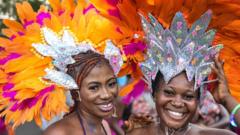The Calabar Carnival, taking place this December, has attracted up to two million attendees to its vibrant celebrations, featuring colorful floats, diverse ethnic performances, and popular music from stars like Runtown and Iyanya, marking its 20th anniversary with a rich showcase of Nigerian culture.
Calabar Carnival Celebrates Two Decades of Culture and Joy

Calabar Carnival Celebrates Two Decades of Culture and Joy
As Nigeria's southern port city of Calabar hosts its annual festival, thousands of revelers gather to celebrate at what is known as "Africa's biggest street party".
This past weekend, the southern Nigerian city of Calabar was transformed into a bustling hub of festivity as throngs of revellers participated in the renowned Calabar Carnival, celebrated as "Africa's biggest street party." The month-long celebration drew people from across the nation and beyond, with estimates from organizers claiming that up to two million attendees flocked to the event.
The carnival featured an array of eye-catching floats and dancers representing Nigeria's rich ethnic diversity, enlivened by high-energy Afrobeats music blasting from massive speakers. Celebrating its 20th anniversary, this year’s event showcased exquisite costumes and creative designs that delighted both participants and spectators alike.
“Everyone is trying to showcase the tradition and the culture,” expressed Rejoice Elemi, a 25-year-old dancer and civil engineering student, reflecting the spirit of the carnival. This year's performances included at least 14 bands competing for the coveted title of best carnival band, which was triumphantly claimed by the Calas Vegas troupe for the second consecutive year.
Moreover, many costumes paid homage to significant historical themes, such as the city’s connections to the Atlantic slave trade and colonial history, represented by attire evoking the British West Africa penny.
Celebrated artists like Runtown and Iyanya energized the crowd at a special carnival concert, further emphasizing the event's role in promoting cultural exchange and tourism. The Cross River State sees the carnival as a means to attract visitors not just from Nigeria, but globally, making it a landmark celebration that continues to resonate with its diverse origins and inclusive spirit.



















